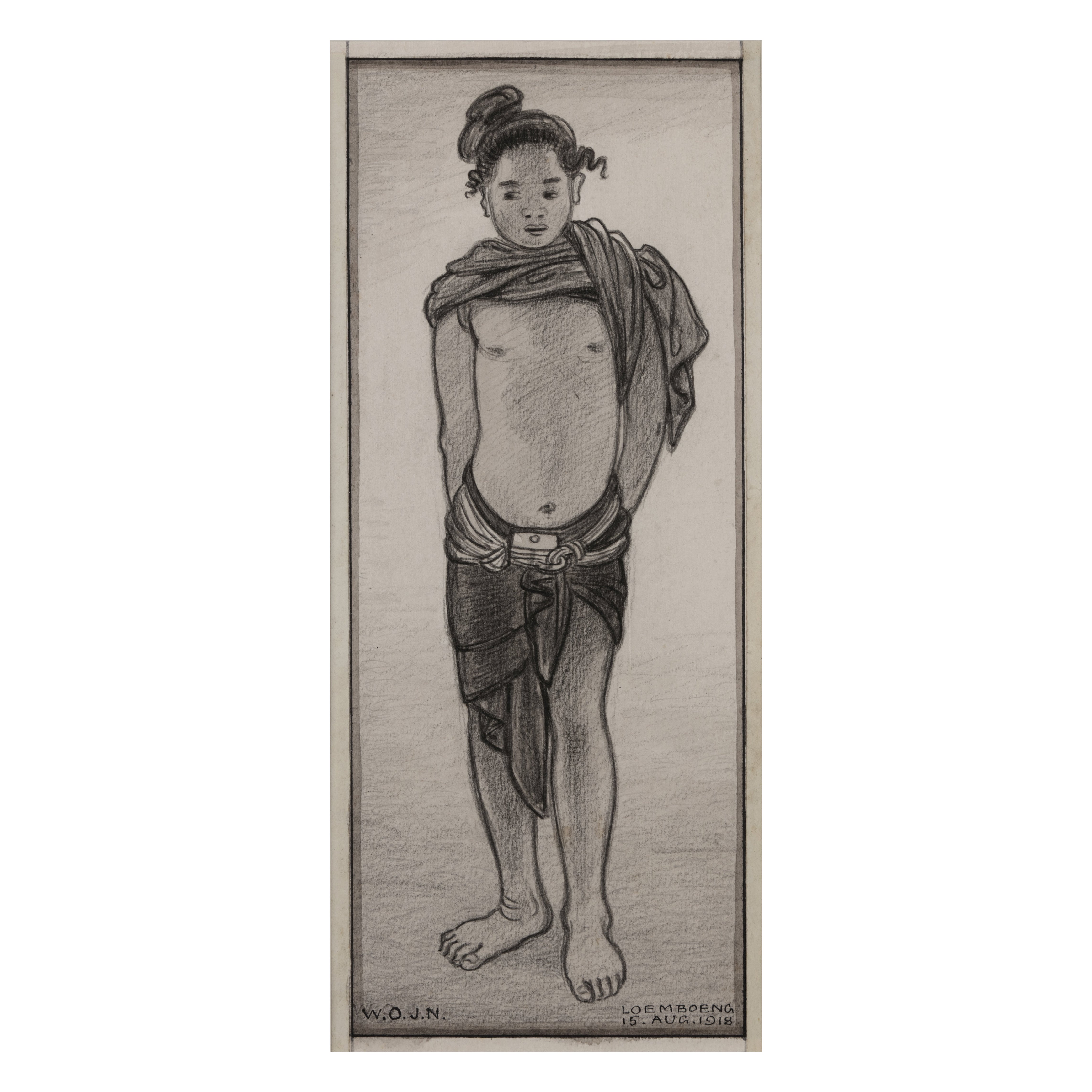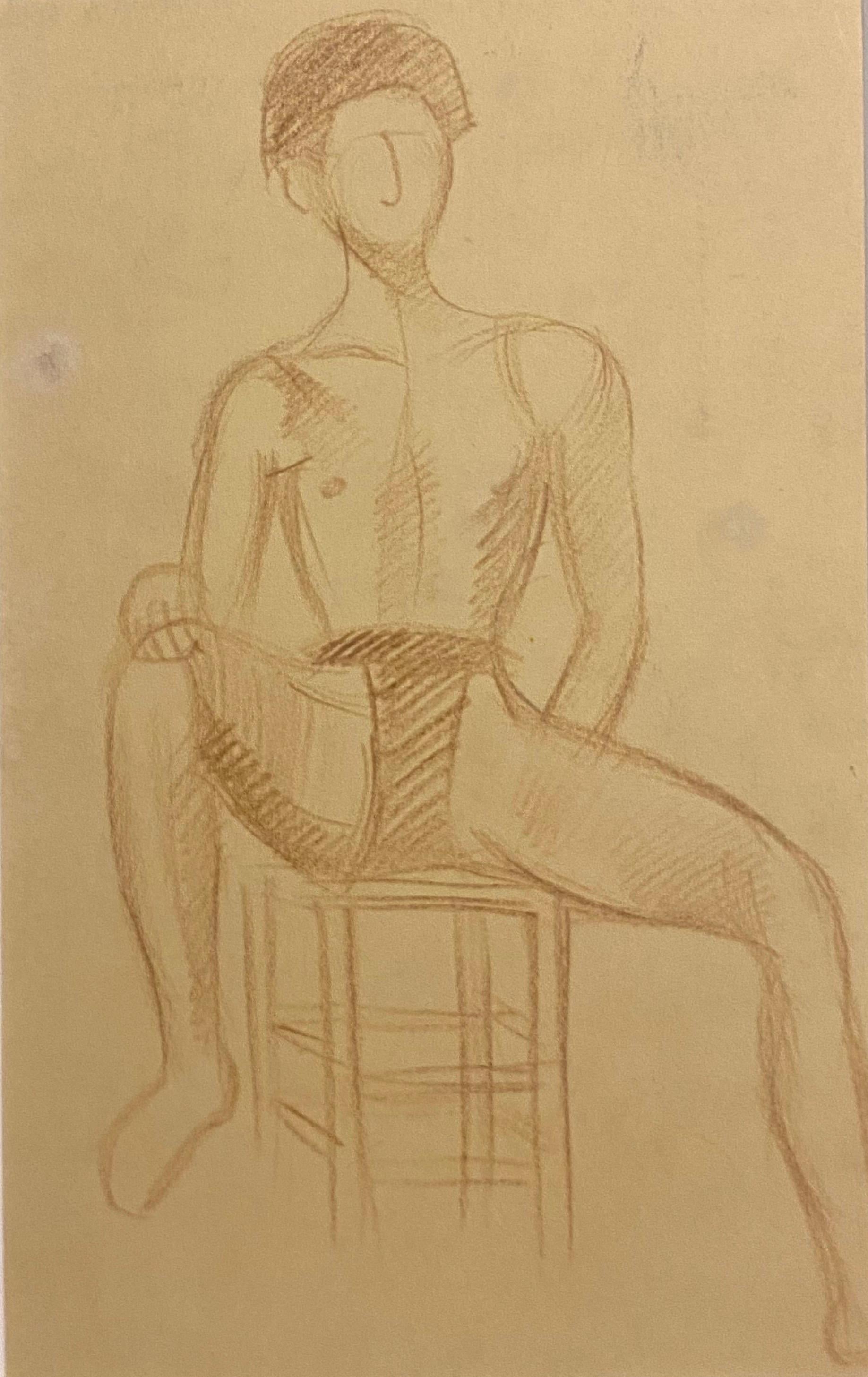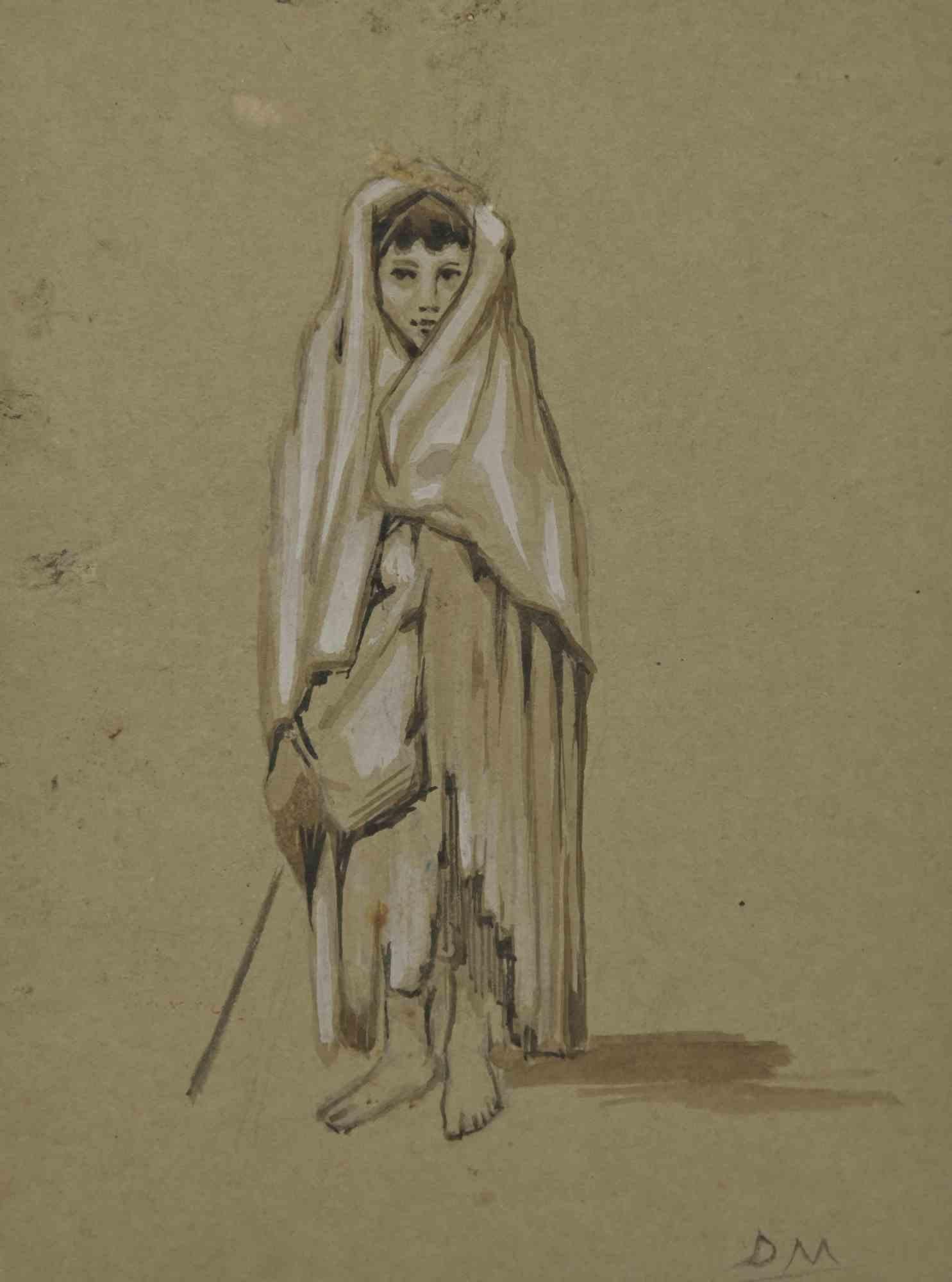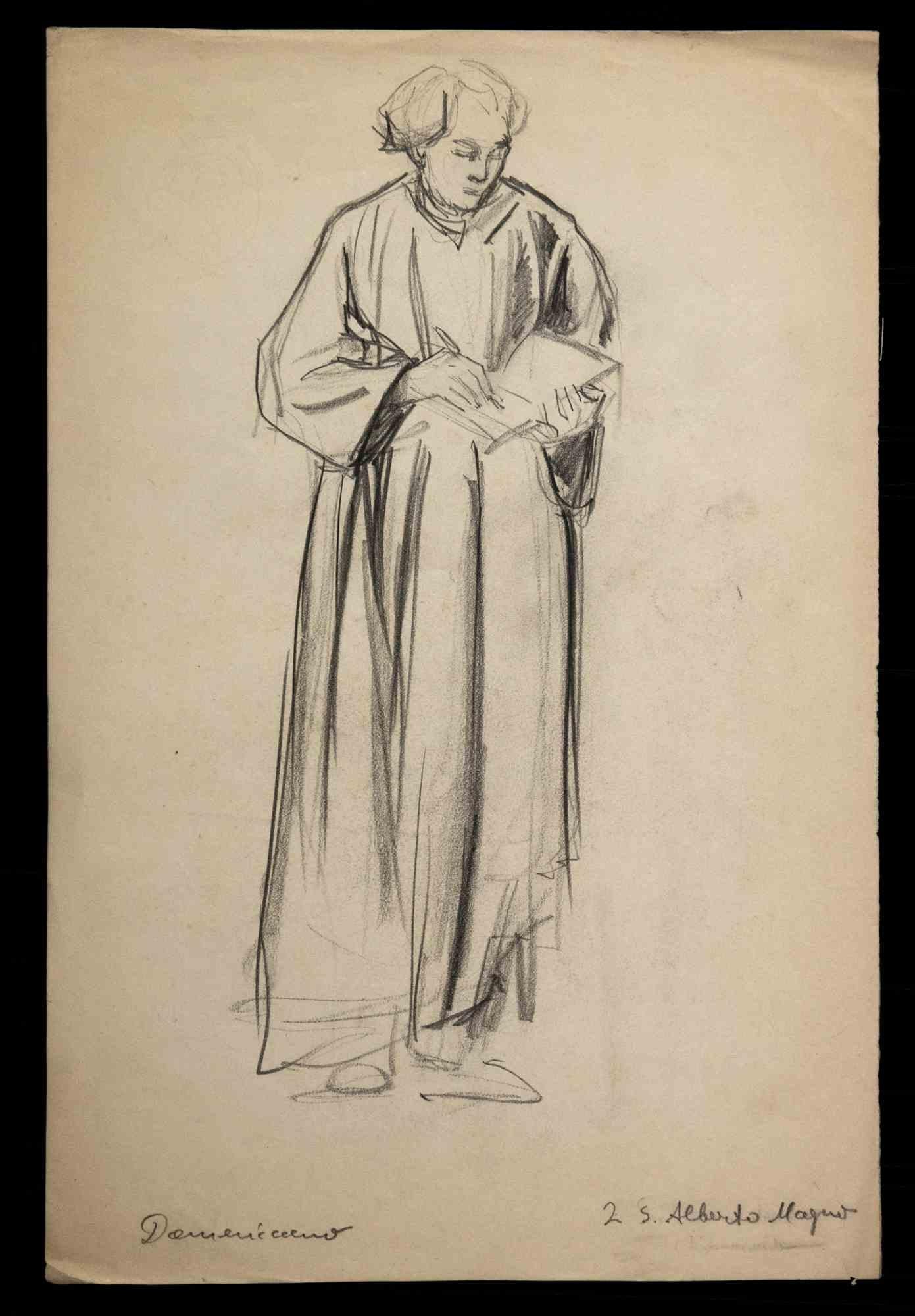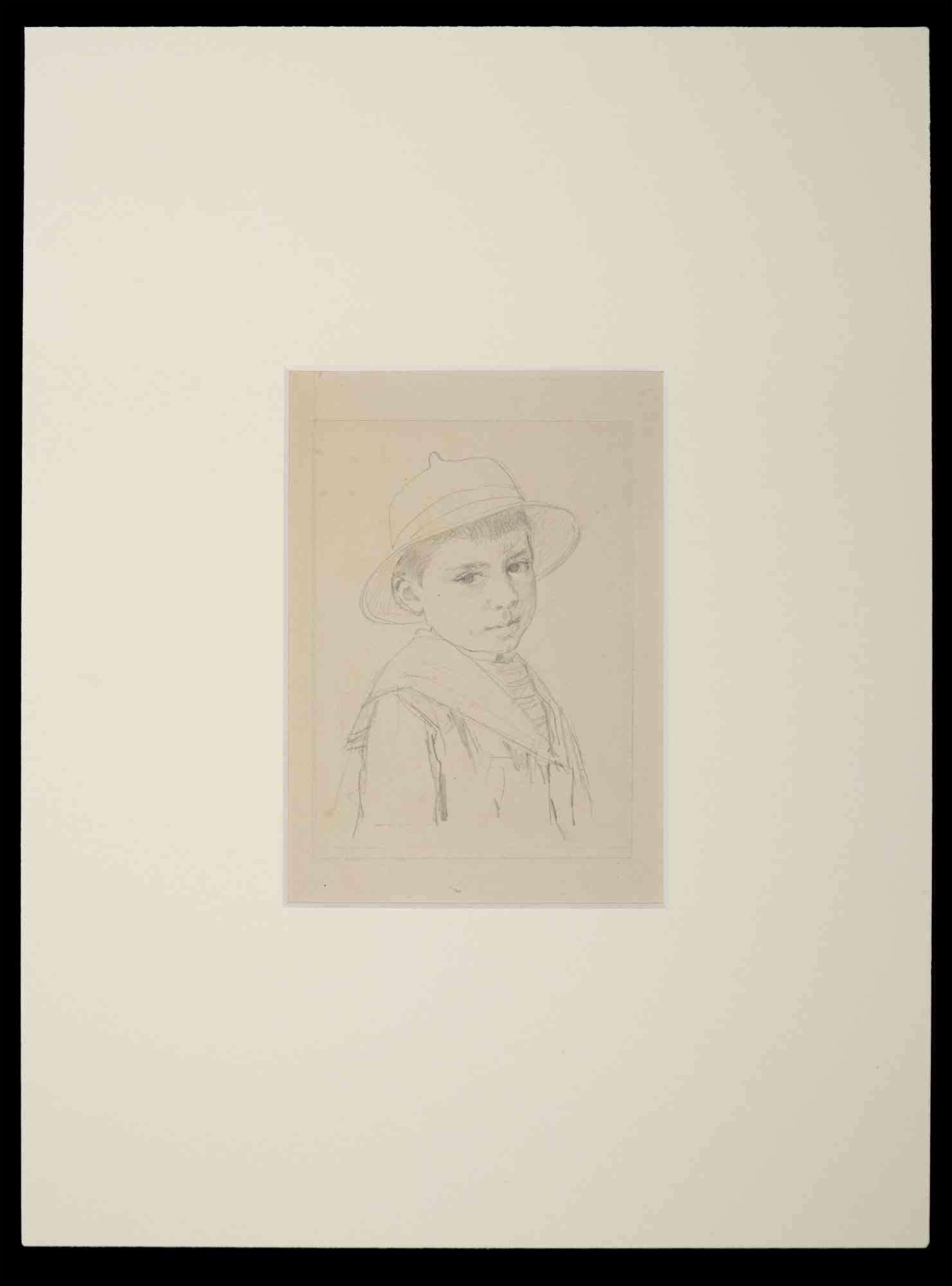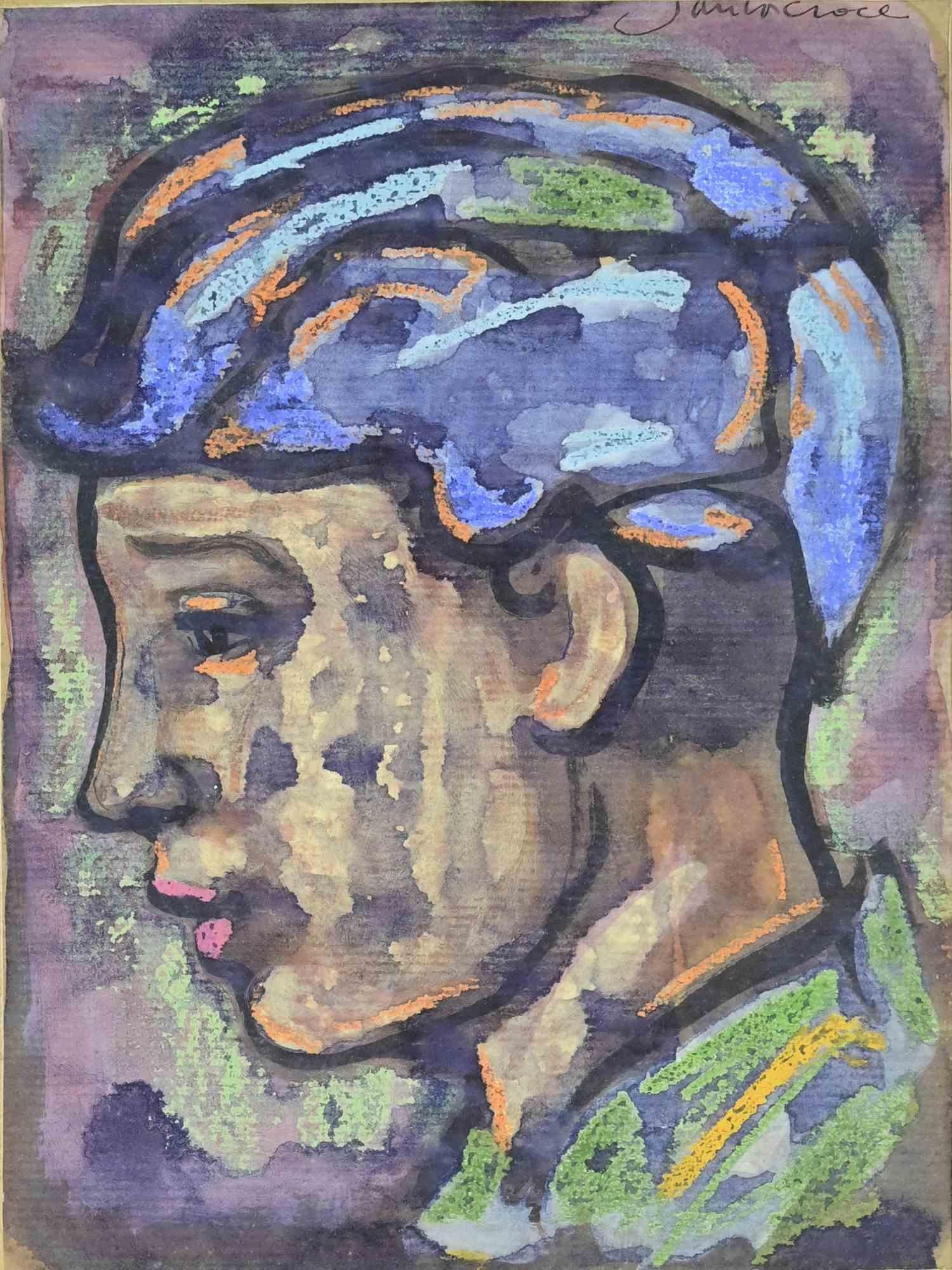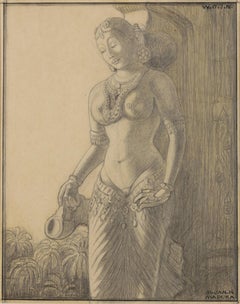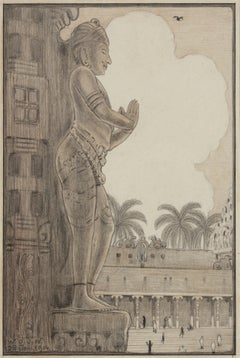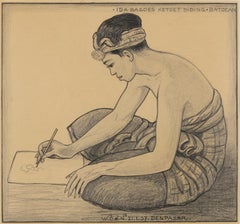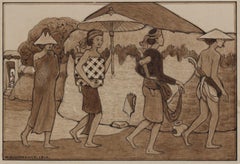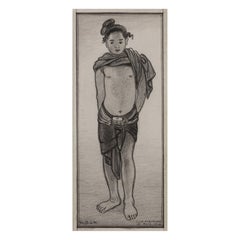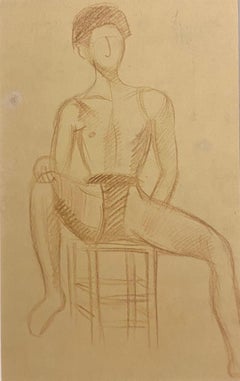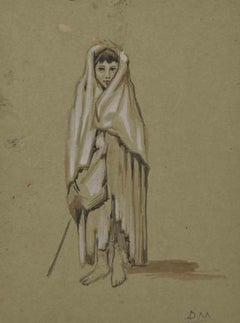Items Similar to Young boy at Loemboeng, 1918
Want more images or videos?
Request additional images or videos from the seller
1 of 4
W.O.J. NieuwenkampYoung boy at Loemboeng, 19181918
1918
$17,198.78
£12,788.41
€14,400
CA$24,156.51
A$26,594.53
CHF 13,592.52
MX$317,412.86
NOK 173,061.81
SEK 161,947.27
DKK 109,710.80
About the Item
Young boy at Loemboeng, 1918
Signed with initials and dated, bottom right
Black chalk on paper, 25.7 x 10 cm
Literature:
W.O.J. Nieuwenkamp, Zwerftochten door Timor en Onderhoorigheden, Amsterdam 1925, p. 138. Ernst Braches and J.F. Heijbroek, W.O.J. Nieuwenkamp. Bouwstoffen, toegepaste grafiek en illustraties, Amsterdam 2016, p. 183 and 365
Black ebonized frame with white mount
Willem Otto Wijnand Nieuwenkamp
(1874-1950)
Nieuwenkamp was born on July 27th 1874 in Amsterdam. His father owned sailing ships sailing to Indonesia and hearing the stories of the returning captains evoked in the young Nieuwenkamp an obsession for distant lands and adventure. After a failed attempt by his father to have his son make a career in his business, Nieuwenkamp attended the Academy for Decorative Art in Amsterdam. However, he left within one year to go his own way.
He was an autodidact and a great experimenter with new techniques, particularly in the art of etching. Nieuwenkamp was a very focused man with the discipline of a scientist tempered by the sensitivity of an artist, a lust for adventure, a natural appreciation for ethnic arts and an enormous ambition to tread new paths.
In 1898 he visited Indonesia for the first time and on his second visit in 1903-1904 he went on to Bali and became the first foreign artist to love Bali and the Balinese with a passion. Having secured agreements with several museums in the Netherlands to obtain Balinese art and objects for their collections, Nieuwenkamp immediately started to purchase and order a wide range of ethnographic art and objects from local artists and craftsmen.
Through his drawings and books, he gave an excellent impression of Balinese art and culture at that time. Since 1854 Northern Bali was under Dutch rule but Southern Bali in 1904, when Nieuwenkamp visited it, was still independent. Nieuwenkamp would be one of the last Westerners to experience a glorious medieval society in its final days. During his second visit to Bali in 1906 the Dutch decided to end the independence of South Bali and Nieuwenkamp was invited by the Governor-General van Heutz to accompany the Dutch invasion force. By contemporary European standards, the Balinese were barbarous and primitive, particularly with widows throwing themselves in the flames of the funeral pyre of their deceased husbands. But Nieuwenkamp was a singular man who saw in their society the beauty and soul that had been lost in his own.
On September 20th, 1906, Denpasar, the capital of South Bali fell to the Dutch military forces. Official military briefings praised the victory which was reported with nationalistic pride on the front pages of all Dutch newspapers. As Nieuwenkamp had witnessed, the truth was far from glorious. As if in trance the Balinese, men women and children, dressed in their finest silks and jewellery and armed with ancient bejewelled krises, the Raja himself mounted atop a golden palanquin, rushed forward, the men killing their wives and children and the Dutch machinegun fire doing the rest. The once-powerful and magnificent court of Denpasar was left in ashes and as many as two thousand Balinese dead. The Dutch suffered four deads.
Nieuwenkamp made drawings and saved as many beautiful architectural elements and artefacts from the rubbles as he could, most of it now in the collection of the Ethnological Museum in Leiden.
- Creator:W.O.J. Nieuwenkamp (1874 - 1950, Dutch, Indonesian)
- Creation Year:1918
- Dimensions:Height: 10.12 in (25.7 cm)Width: 3.94 in (10 cm)Depth: 1.19 in (3 cm)
- More Editions & Sizes:25.7 x 10 cmPrice: $17,199
- Medium:
- Movement & Style:
- Period:
- Framing:Frame IncludedFraming Options Available
- Condition:
- Gallery Location:Amsterdam, NL
- Reference Number:1stDibs: LU147128029832
About the Seller
No Reviews Yet
Vetted Professional Seller
Every seller passes strict standards for authenticity and reliability
1stDibs seller since 2021
- ShippingRetrieving quote...Shipping from: Amsterdam, Netherlands
- Return Policy
Authenticity Guarantee
In the unlikely event there’s an issue with an item’s authenticity, contact us within 1 year for a full refund. DetailsMoney-Back Guarantee
If your item is not as described, is damaged in transit, or does not arrive, contact us within 7 days for a full refund. Details24-Hour Cancellation
You have a 24-hour grace period in which to reconsider your purchase, with no questions asked.Vetted Professional Sellers
Our world-class sellers must adhere to strict standards for service and quality, maintaining the integrity of our listings.Price-Match Guarantee
If you find that a seller listed the same item for a lower price elsewhere, we’ll match it.Trusted Global Delivery
Our best-in-class carrier network provides specialized shipping options worldwide, including custom delivery.More From This Seller
View AllStone Statue, Madura, India, 1914
Located in Amsterdam, NL
Stone statue in the temple at Madura, India, 1914
Signed with initials and dated, bottom left
Pencil on paper, 25.4 x 16.7 cm
Literature:
Ernst Braches en J.F. Heijbroek, W.O.J. ...
Category
1910s Art Nouveau Landscape Drawings and Watercolors
Materials
Paper, Pencil
Stone Statue, Madura, India, 1914
Located in Amsterdam, NL
Stone statue in the temple at Madura, India, 1914
Signed with initials top right
Pencil on paper, 21.2 x 16.7 cm
Literature:
Ernst Braches en J.F. Heijbroek, W.O.J. Nieuwenkamp,B...
Category
1910s Art Nouveau Landscape Drawings and Watercolors
Materials
Paper, Pencil
Portrait of artist Ida Bagoes Ketut Diding, Bali, 1937
Located in Amsterdam, NL
Ida Bagoes Ketut Diding, Artist on bali 1937
Signed with initials, dated and titled, bottom centre
Black chalk on paper, 29 x 31 cm
Literature:
Ernst Braches en J.F. Heijbroek, W....
Category
1930s Art Nouveau Landscape Drawings and Watercolors
Materials
Paper, Graphite
Four Balinese, Bali (1910)
Located in Amsterdam, NL
Four Balinese, 1910
Signed and dated bottom left
Pencil and ink on paper, 15.6 x 23 cm
In ebonized frame with white mount.
Literature:
W.O.J. Nieuwenkamp, Zwerftochten op Bali, Amsterdam, 1910, p. 36
WILLEM OTTO WIJNAND NIEUWENKAMP
(1874-1950)
Nieuwenkamp was born on July 27th 1874 in Amsterdam. His father owned sailing ships sailing to Indonesia and hearing the stories of the returning captains evoked in the young Nieuwenkamp an obsession for distant lands and adventure. After a failed attempt by his father to have his son make a career in his business, Nieuwenkamp attended the Academy for Decorative Art in Amsterdam. However, he left within one year to go his own way.
He was an autodidact and a great experimenter with new techniques, particularly in the art of etching. Nieuwenkamp was a very focused man with the discipline of a scientist tempered by the sensitivity of an artist, a lust for adventure, a natural appreciation for ethnic arts and an enormous ambition to tread new paths.
In 1898 he visited Indonesia for the first time and on his second visit in 1903-1904 he went on to Bali and became the first foreign artist to love Bali and the Balinese with a passion. Having secured agreements with several museums in the Netherlands to obtain Balinese art...
Category
1910s Art Nouveau Landscape Drawings and Watercolors
Materials
Paper, Pencil
Wobbly bridge, Tabanan, Bali, 1937
Located in Amsterdam, NL
Wobbly bridge, Tabanan, Bali, 1937
Signed with initials bottom right and dated, bottom left
Pencil and ink on paper, 22 x 26.3 cm
In ebonized frame with white mount
Willem Otto Wi...
Category
1930s Art Nouveau Landscape Drawings and Watercolors
Materials
Paper, India Ink, Pencil
Incoming Rain, Bali, 1937
Located in Amsterdam, NL
Incoming rain, Den Pasar, Bali 1937
Signed with initials, dated and titled, bottom right
Black chalk and ink on paper, 42 by 46 cm
Literature:
Ernst Braches en J.F. Heijbroek, W.O...
Category
1930s Art Nouveau Landscape Drawings and Watercolors
Materials
Paper, Graphite
You May Also Like
W.O.J. Nieuwenkamp (1874-1950) 'Young boy at Loemboeng, 1918'
Located in Amsterdam, NL
Signed with initials and dated, bottom right
Black chalk on paper, 25.7 x 10 cm
Literature:
W.O.J. Nieuwenkamp, Zwerftochten door Timor en Onderhoorigheden, Amsterdam 1925, p. 13...
Category
Early 20th Century Indonesian Paintings and Screens
Materials
Paper
Portrait of a Boy - Original Drawing - 1930s
By Jean Delpech
Located in Roma, IT
"Portrait of a Boy" is an original drawing in sanguine on paper, realized by Jean Delpech (1916-1988).
The state of preservation of the artwork is very good.
Included passepartout...
Category
1930s Modern Figurative Drawings and Watercolors
Materials
Paper, Pencil
The Boy - Drawing by Augusto Monari - Early 20th Century
Located in Roma, IT
The Boy is a Drawing in pencil, watercolor, and white lead realized by Augusto Monari in the Early-20th Century.
Monogrammed on the lower.
Good conditions, including a creamy-colo...
Category
Early 20th Century Modern Figurative Drawings and Watercolors
Materials
Watercolor, Pencil
Portrait of Albertus Magnus - Original Drawing - Early 20th Century
Located in Roma, IT
Portrait of Albertus Magnus is an original drawing in pencil realized by an anonymous artist in the early 20th Century.
Good conditions except for being aged.
The artwork is depict...
Category
Early 20th Century Modern Figurative Drawings and Watercolors
Materials
Pencil
Portrait of Young Boy - Original Drawing by L.E. Adan - early 20th Century
Located in Roma, IT
Portrait of Young Boy is an original drawing in Pencil realized by Emile Adan (1839-1937) in the early 20th Century.
Good Conditions.
The artwork is depicted through soft strokes i...
Category
Early 20th Century Modern Figurative Drawings and Watercolors
Materials
Pencil
Portrait of a Boy - Drawing by Antonio Santacroce - 1980s
Located in Roma, IT
Watercolor on paper mounted on a wooden panel, realized by Antonio Santacroce (1945) in 1980s.
Hand signed.
Includes a contemporary wooden frame cm.54x46.5.
Very good condition.
Category
1980s Contemporary Figurative Drawings and Watercolors
Materials
Watercolor
More Ways To Browse
Young Boy
Painting Of A Young Boy
Portrait Of A Young Boy
Ethnographic Art
Painting 1918
Bali Antique
Portrait Painting Boy Framed
Dutch Fire
Portrait Painting Young Boy
Balinese Antique Art
Oil Paintings Landscapes In Europe
Museum Exhibit
Oil Paintings On Wood Panel
Unique Paintings
Large Landscape Oil On Canvas
20th Century American Landscape Paintings
20th Century Landscape Painting American
Vintage Kennedy
